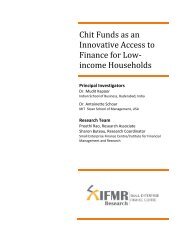Government of India Volume I: Analysis and Recommendations
Government of India Volume I: Analysis and Recommendations
Government of India Volume I: Analysis and Recommendations
You also want an ePaper? Increase the reach of your titles
YUMPU automatically turns print PDFs into web optimized ePapers that Google loves.
FUNCTIONS AND POWERS OF THE REGULATOR<br />
Table <strong>of</strong> <strong>Recommendations</strong> 4.6 General executive functions <strong>of</strong> a regulator<br />
The Commission recognises that regulator must carry out certain general executive functions on a routine basis.<br />
These include:<br />
1. Grant <strong>of</strong> approvals, including licensing or registration;<br />
2. Inspections, which may be routine or special;<br />
3. Proving violation <strong>of</strong> regulations to the judicial <strong>of</strong>ficers (by leading evidence);<br />
4. In the case <strong>of</strong> successful prosecution before the administrative law department, suggesting enforcement actions;<br />
<strong>and</strong><br />
5. Compounding <strong>of</strong> <strong>of</strong>fences with the involvement <strong>of</strong> the administrative law department.<br />
<strong>of</strong> executive function may place an undue burden on regulated entities <strong>and</strong> financial markets.<br />
Long pending investigations create uncertainty for businesses. When news <strong>of</strong> ongoing<br />
investigations leaks, it may inflict damage to the reputation <strong>of</strong> any financial firm.<br />
Similarly, injunctions placed on businesses under investigation have strong economic<br />
implications <strong>and</strong> should be placed for the shortest possible period. These problems can<br />
be checked by putting in place legal measures that require investigations to be finished<br />
within specified time, <strong>and</strong> kept confidential from the public.<br />
The Commission notes that the overall approach <strong>of</strong> the draft Code should be to provide<br />
for strong executive powers, balanced with greater transparency <strong>and</strong> accountability,<br />
to prevent abuse. Executive functions <strong>of</strong> regulator do not have st<strong>and</strong>ardised statutory<br />
checks under present legislations. Therefore, the Commission recommends that adequate<br />
transparency requirements, checks <strong>and</strong> judicial oversight be placed on the exercise<br />
<strong>of</strong> executive functions by regulator. This will also reduce allegations <strong>of</strong> possible bias<br />
<strong>and</strong> arbitrariness to the minimum.<br />
It is also important to ensure that there is no overlap in the legislative <strong>and</strong> executive<br />
functions <strong>of</strong> the regulator. The executive should not be allowed to issue instructions <strong>of</strong> a<br />
general nature to all regulated entities or a class <strong>of</strong> regulated entities. Such instructions<br />
should only be possible after the full regulation-making process has been followed.<br />
Table 4.6 sets out the areas in which the Commission has made specific recommendations<br />
regarding the exercise <strong>of</strong> executive powers.<br />
4.2.1. Permission <strong>and</strong> approvals<br />
Granting permissions to start a business is the core function <strong>of</strong> any regulator. This is also<br />
the first barrier to entry for new entrants to any business. Each new business permission<br />
also increases the burden on the regulator as it increases the number <strong>of</strong> entities it has to<br />
monitor. The draft Code must grant the regulator discretion to approve or reject applications.<br />
The Commission has decided that the power must be exercised in a manner guided<br />
by regulations. As far as possible the discretion <strong>of</strong> the regulator should be guided through<br />
an underlying duty to explain. The power <strong>of</strong> the regulator to reject applications should be<br />
balanced with the requirement for allowing legitimate parties getting approvals in a time<br />
bound manner for smoother functioning <strong>of</strong> the regulatory system. Table 4.7 summarises<br />
the recommendations <strong>of</strong> the Commission for governing the procedure for disposing applications.<br />
4.2.2. Information gathering<br />
Regulator requires information about the activities <strong>of</strong> their regulated entities. It may also<br />
require information from private sources <strong>and</strong> other government agencies. At present,<br />
a diverse array <strong>of</strong> mechanisms are used by firms to submit information to regulatory<br />
FINANCIAL SECTOR LEGISLATIVE REFORMS COMMISSION 33



